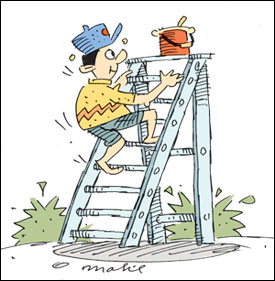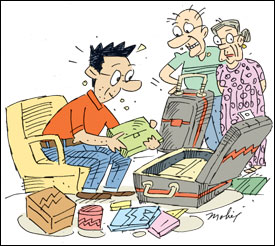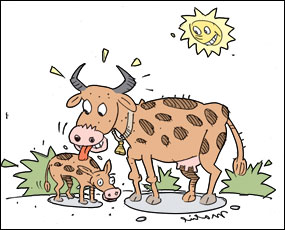|

by R. S. Karunaratne
How to use 'though'
in different forms
Guide to the use of 'though, although', 'even though' and 'as though'
Both 'though' and 'although' are used to introduce subordinate
clauses. However, 'although' is more formal than 'though'. In spoken
English 'though' is more frequent than 'although'.
'Although' usually means 'in spite of the fact that ....' or 'despite
the fact that....'
|

The boy climbed up the ladder although
he knew it was dangerous. |
Although he gave us many promises, he did not keep any of them.
The boy climbed up the ladder although he knew it was dangerous.
Sam decided to go abroad although his parents begged him not to.
I will get a job in the future although I don't know when.
Though I respected him, he was rude to me.
'Though' also has the additional meaning: 'but it is also true
that...'
It was a beautiful and expensive painting, though I did not like it.
Though the work was tedious, the payment was attractive.
Father is coming home next week, though I do not know the exact date.
Even though (written as two words) is used for emphasis. 'Even' is
usually used with 'though' but not with 'although'.
Even though she was a beauty queen, some people did not like her.
'As though' is an expression frequently used by English speakers. It
means 'as if'.
You look as though you are trying to solve a mystery.
Activity
Fill in the blanks with though, although, even though, and as though.
Check your answers with the key.
1. ....... I hold an important position, I'm not well - paid.
2. He wasn't wearing a coat ....... he was attending a wedding.
3. ...... I don't speak French, I can understand what you say.
4. ....... the AC was on, the room wasn't cool.
5. I couldn't recognise him ....... I had met him before.
6. We are not friends ...... we've known each other.
7. ..... She had a ticket, she didn't board the plane.
8. ...... I'm ill, I'm going to play.
9. He walked in .... he owned the office!
|

Sam decided to go abroad although his parents begged him not to. |
10. He ran fast ..... he was chased by a tiger!
11. ..... you have every right to say it, I don't agree with you.
12. ...... you're my friend, I can't help you in this matter.
13. ...... she was pretty, nobody liked her.
14. ....... I'm old, I keep myself occupied.
15. She behaves ..... she were an actor.
**********
[Key]
1. Although 2, although 3. Although 4. Although 5. although 6.
although 7. Even though 8. Even though 9. as though 10 as if 11.
Although 12 Though 13. Although 14 Even though 15. as though.
**********

An enriched vocabulary helps you to speak and write fluently. To
increase your vocabulary do the following quiz and check your answers
with the key.
1. In antebellum Missippi, slave auctions were widely attended.
(a) before the war
(b) after the war
(c) during the war
2. Father leaves for work betimes, before the sun rises.
(a) early
(b) late
(c) as soon as
3. A biennial plants last for two years.
(a) twice a year
(b) happening every two years
(c) once a year
4. Eons ago, dinosaurs roamed this part of the country.
(a) sometime
(b) short time
(c) thousands of years
5. Most filmstars do not know that fame is ephemeral.
(a) ever lasting
(b) shortlived
(c) permanent
6. Prakramabahu the Great started an amazing epoch in the history of
Sri Lanka.
(a) noteworthy period
(b) a period of decay
(c) long period
7. Have you ever heard of a university that celebrated its
tercentenary.
(a) a period of 100 years
(b) a period of 200 years
(c) a period of 300 years
8. Poor study habits were the bane of Kumara's academic career.
(a) cause of success
(b) cause of ruin
(c) cause of regret
9. Father eked out his income by working at night.
(a) supplemented
(b) earned
(c) spent
10. Some people mete out their friendship by the drop; others, by the
cupful.
(a) renew
(b) forget
(c) allot
************
[Key]
1. (a), 2. (a), 3. (b), 4. (c), 5. (b), 6. (a), 7. (c), 8. (b), 9.
(a), 10. (c).
************
Starters :
Demonstrative
adjectives and pronouns
There are only four demonstrative adjectives and demonstrative
pronouns in English. They are: This, That, These and Those.
We use 'this' and 'that' with singular nouns. 'These' and 'those' are
used with plural nouns.
This is a beautiful flower.
|

That cow is grazing with its calf. |
This tree bears fruit.
This is the school where I studied.
This shirt is blue.
This man is a pickpocket.
That car belongs to my father.
That cat has three playful kittens.
That boy attends S. Thomas College.
That cow is grazing with its calf.
That tree should not be cut down.
Note: 'This' is used to point to people and things that are near us.
'That' is used to point to people and things that are far from us.
Remember that 'this, that, these,' and 'those' refer to specific
people and things.
Demonstrative adjectives and demonstrative pronouns can be
distinguished easily.
When 'this, that, these' and 'those' are used without nouns, they
become pronouns.
This costs more than that.
Put that down.
Keep these with you.
Look after those until I comeback.
'This, that, these' and 'those' can also be used as pronouns when we
say who people are.
This is Susila.
Is that Samanthi?
These are the Pereras.
Those are the children.
'This' and 'these' can be used to refer to situations and events
which are going on or just about to start.
I like this music.
Listen to this.
Watch this.
This is an SOS. (Save Our Souls message)
'That' and 'those' refer to situations and events which have just
finished, or which are more distant in the past.
That was nice.
Did you see that?
'That's' how it happened.
A: Do you want anything else, sir?
B: No, that's all.
OK. That's it.
In British English you use 'this' to identify yourself when you speak
on the telephone.
Hello.
This is Arandara. Is that Sabitha?
Americans also use 'this' to ask about the hearer's identity.
Who is this?
'This' and 'that' can mean 'so.'
I never knew a fountain pen is going to be this expensive.
If you are that clever, why don't you apply for the post?
A: How is the novel?
B: Not all that good.
In spoken English we use this in a special way.
There was this sweep seller... you know...
'That' can suggest a past experience.
I can't stand that man. |

